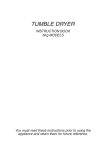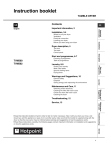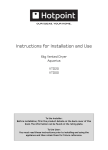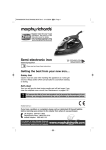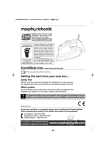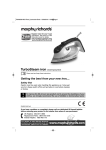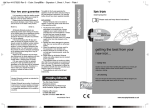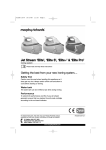Download Condensing Tumble Dryer
Transcript
Condensing Tumble Dryer Instruction Book You must read these instructions prior to using the appliance and retain them for future reference. Contents Getting to know your Dryer Important Safety Points Installation of your Dryer Caring for your Wash Sorting your laundry Items requiring special attention How to operate your Dryer Electrical Requirements Caring for your Dryer Something Wrong? Service – Creda Tumble Dryers 3 4 5 6 7 8 9 13 14 Inside Back Cover Back Cover EEC Standards This appliance conforms to the following EEC Directives: Low Voltage Equipment 73/23/EEC 93/68/EEC Electromagnetic Compatibility 89/336/EEC 92/31/EEC 93/68/EEC Retention of this Instruction Book This Instruction Book should be kept at hand, as it contains important details on the safe and correct use of the appliance. If you sell or pass the appliance to someone else, or move house and leave it behind, make sure this Book is also provided so the new owner can become familiar with the appliance and safety aspects. 2 Features - Getting to Know Your Dryer CONTROL PANEL PUSH HERE TO OPEN DOOR AIR INTAKE GRILLE PLINTH (NOT ON ALL MODELS) SERIAL/MODEL No. (RECORD DETAILS ON SERVICE PAGE AT REAR.) FLUFF FILTER REVERSIBLE DOOR CATCH CONDENSER DOOR CATCH WATER CONTAINER Using your Dryer is easy. Nevertheless, for your own safety and to achieve the best results, it is important to read through this handbook before using the appliance. Your Condenser Dryer requires specific attention, more so than a vented dryer to maintain optimum performance. 3 Important Safety Points Note: This Dryer is only suitable for Domestic use. Never ... ✘ Never allow children to play with the Dryer. ✘ Never use liquid conditioner in the Dryer. ✘ Never switch the machine off leaving a hot load in the drum. ✘ Do not dry articles that have not been washed, rinsed and spun. ✘ Never tumble dry without the filter, condenser and water container in position. ✘ Never attempt to stand on top of your Dryer. ✘ Never exceed maximum recommended load capacity. ✘ Never dry fabrics that have been chemically cleaned or have become contaminated with solvents. ✘ Never place dripping wet items in the drum. ✘ Never obstruct or drape anything over the dryer which may block the rear vents. ✘ Never allow lint to collect around the Dryer. ✔ Always finish every programme with the cool cycle. ✔ ✔ Always clean the filter of fluff after use. ✔ Always buy genuine Manufacturer’s Spares and accessories. Always ... ✔ Always switch off at the Wall, remove plug and close the Door when not in use. ✔ Always comply with the specified electrical requirements. ✔ Ensure that your Dryer is installed correctly and has adequate ventilation. ✔ Ensure air intake grille is never obstructed or blocked. 4 Always empty Water Container after every programme. Installation of your Dryer Location There is no internal packing to be removed before use, but make sure the drum is empty. Wipe the inside of the Drum before use to remove any transit dust. Your Dryer does not blow moist air into the room, avoiding the requirement of a vent hose. Position the Dryer where air can freely circulate around it, a 15mm gap each side is recommended. HINGE DOOR CATCH DOOR LATCH HINGE Door Reversal Instructions The door of your Dryer is reversible and can easily be changed before installation. Exchange diagonally the hinge brackets for blanking plugs. Exchange door latch and catch with their opposing blanking plates. See diagram above. Support the weight of the door when removing hinges. Stacking Your Appliance Dryers can be to permanently stack on top of Washing machines, saving valuable floor space. The Dryer should not be located next to a hob, cooker, heater or high level grill, as heat from these appliances could cause damage. When ordering you must state the product numbers of the Washing machine and Tumble Dryer (Tel. No. 0541 530 530). Note: Separate mains plugs and sockets must be used for each appliance. Do not use 2-way adaptors or extension leads. As the dryer is heavy assistance should be obtained when stacking the dryer. 5 Caring for your Wash The following wash-care labels should be observed. Item can be used in Dryer. Dry at high heat setting. Do not use in Dryer. Dry on low heat setting. The majority of fabrics today can be dried in a Dryer. There are however certain fabric finishes which need to be dried away from direct heat. Items not suitable for your Dryer ... Items containing Rubber or Plastic film, e.g. pillows, cushions, PVC rainwear. Items which have been dry cleaned. Woollen articles. Inflammable articles or items containing inflammable substances, e.g. towels contaminated with hair lacquer. Large bulky items, e.g. pillows, continental quilts, sleeping bags, double blankets and large bedspreads. Fibreglass, e.g. some types of curtains. Fabric Conditioner For really fresh and soft fabrics, we recommend you use a liquid fabric conditioner in the final rinse of your wash. This helps to eliminate the build up of static. 6 Sorting your laundry The same care should be taken for Drying fabrics as when Washing, e.g. split fabric groups, close all zips and hooks, belts and strings should be tied in loose bow. It is important to extract as much water as possible from each item before drying. This reduces the drying time, energy consumption and the running cost. Maximum Dry Load Size Cotton fabrics max. 6 Kg (13.2 lb) Synthetics, eg Polyester, polycotton max. 3 Kg (6.6 lb) Acrylics max. 2 Kg (4.4 lb) Note: Man-made fibres require more space to dry without creasing. If cotton/terry towelling items are grouped with synthetic fabrics they could remain damp at the end of the drying cycle. If this occurs, simply replace cottons for a short period of drying to finish off. Typical Load Clothing articles The table below shows the approximate weight of everyday items. Blouse Cotton Other 150g 100g Dress Cotton Other 500g 1 lb 2oz 350g 12oz Jeans 700g 1 lb 6oz 10 Nappies Shirt 1000g 2 lb 3oz Cotton Other T-shirt Household items Duvet cover Cotton (Double) Other Tablecloth 5oz 4oz Large Small Tea Towel 300g 200g 10.5oz 7oz 150g 5oz 1500g 3 lb 5oz 1000g 2 lb 4oz 700g 1 lb 6oz 250g 9oz 100g 4oz Bath Towel 700g 1 lb 8oz Hand Towel 350g Sheets Double Single (Note: 1 Kg = 1000g) 12oz 500g 1 lb 2oz 350g 12oz Note: When drying sheets, part way through the cycle, remove and open them out to ensure full and even drying. To continue the programme press the start button. 7 Items requiring special attention Blankets and Bedspreads Drying requirements of blankets and bedspreads vary according to size, weight and fabric. If you have difficulty getting them into the Dryer, the machine will have difficulty drying them properly as they expand when drying and prevent air flow through the Dryer. This can cause the appliance to overheat. Blankets (e.g. Acrilan, Courtelle, Dralon and Orlon) must never be over dried. Such acrylic fabrics should be dried with care on low heat. Always refer to manufacturers drying instructions. Permanently pleated or creased garments Starched articles Always dry starched articles separately from your normal garments. Ensure as much of the solution is removed from the garments as possible before placing in the Dryer. Use a slightly heavier starch solution than you would when drying items on the washing line. If garments are over dried the starch will powder, leaving the fabric limp. 8 How to operate your Dryer 1. Ensure hands are dry. Plug the appliance in. Switch on at the wall socket. 2. Open the Door by pressing the Front panel as shown. PUSH HERE & RELEASE TO OPEN DOOR 3. Place the selected fabrics into the Dryer. Ensure the fabrics are pushed towards the back of the Drum and away from the Door seal. 4. Always check the following: FLUFF FILTER is clean and in place WATER CONTAINER is empty and in place CONDENSER is in place 5. Close the Door. 6. Select the required heat setting. Press switch in at Top Low Heat Acrylics and Synthetics Press here for Low Press switch in at Bottom High Heat Cottons Press here for High 9 How to operate your Dryer 7. Rotate the Timer control to select the appropriate required drying time. All of our Dryers have an energy saving feature which reduces the heat input when the temperature in the drum reaches a predetermined level. Timed Dryers: TIMER CONTROL l0 20 0 12 10 coo Select the required Drying time by rotating the Timer control clockwise (up to 120 minutes) just past the required time, then anti-clockwise to the desired time. Refer to the Drying guide. 30 110 NOTE: Never force the Timer control beyond the stop positions. 100 40 CONTROL PANEL HEAT SWITCH START BUTTON EMPTY WATER LIGHT 50 90 80 60 70 FILTER CARE (NOT ALL MODELS) Automatic Eco/Economy Dryer: TIMER CONTROL om a 0 NOTE: Only turn the Timer control clockwise. 40 t i m e d d r yi ng 30 a ut co ol 1 tic 100 0 0 co 20 ol E The timer control gives you the choice of either Eco/ Economy or timed drying. To select the Eco/Economy programme turn the timer control clockwise to the E position. The ecosense/economy light will switch on. When the load is dry this programme automatically advances into the cool cycle, at which point the ecosense/ economy light will switch off. HEAT SWITCH START BUTTON EMPTY WATER LIGHT 90 50 CONTROL PANEL 60 70 80 ECO/ ECONOMY PROGRAMME ECOSENSE/ ECONOMY LIGHT The Timer control can be set manually to any time (up to 100 minutes). This is particularly useful for damp dry results. The Eco/Economy option optimises the energy efficiency, saving time and money for the user. 10 How To Operate Your Dryer Drying Times & Heat Settings The drying time will depend on the size of the load, the type of fabric and the wetness of the load. It is therefore not possible to give exact drying times but experience will quickly enable you to set the appropriate time for fully drying or damp drying to your requirements. As an approximate guide, the following table may assist you. The times shown include the cool tumble period, in minutes. The Kg weights specified are fabric dry weights. COTTONS SYNTHETICS Drying times when spun at 800-1100rpm in washing machine times – Drying times – reduced Drying spin in spin in washing machine reduced washing machine High heat Low heat Half Load Full Load ACRYLICS Low heat Half Load Full Load Half Load Full Load 1 Kg 2 Kg 3 Kg 4 Kg 5 Kg 1 Kg 2 Kg 3 Kg 1 Kg 2 Kg 30-40 40-55 55-70 70-80 80-90 95-120 40-50 50-70 70-90 40-60 55-75 6 Kg 8. Press and release the START switch to commence the Drying programme. NOTE: If the Door is opened during a programme, the Dryer will automatically stop. To continue the programme, upon closing the Door, the START switch must be re-pressed. 9. The Heating programme can be terminated at any time by turning the Timer control to the Cool cycle position. NOTE: Always complete a programme with the Cool cycle. Never switch the Dryer off, leaving a hot load in the Drum. 10. Allow the Cool cycle to finish then remove the laundry from the appliance. This reduces creasing of fabrics. 11. Ensuring hands are dry, switch off the Appliance and remove and plug from the wall socket. 12. Always remove and clean the Filter after EVERY programme. A light will come on when you open the door to remind you to clean the fluff filter on some models. NOTE: Wash or vacuum clean the filter occasionally. 11 How To Operate Your Dryer EMPTY WATER CONTAINER LIGHT WATER CONTAINER WATER CONTAINER SINK 13. Remove plinth moulding (where fitted) by slightly lifting and sliding to the left. Remove the water container and empty after EVERY programme. Failure to do this will result in the water container becoming full and the load will not dry. PLINTH MOULDING WHEN FITTED NOTE: The light on the control panel only comes on when the water container is full. When the light is on you should stop the dryer and empty the water container. This should be avoided by emptying the container between cycles. If the light comes on during a cycle (Eco machines) the timer will automatically advance to ‘cool run’. FLUFF FILTER 14. EVERY month, remove and clean the Condenser unit by pouring cold water through all the tubes. This prevents the air passage ways from being blocked by fluff. TAP REAR FRONT CONDENSER 12 Electrical Requirements This appliance should be connected to the mains supply via a suitable switched socket, which is in a position accessible after installation. Refer to rating plate for the supply voltage. Supply Warning: This appliance must be earthed. Changing the Plug The flexible mains lead is supplied connected to a BS1363 fused plug with a 13 amp capacity. If this plug is removed or cut off, it should be properly disposed of and not left where children might find it and plug into a supply socket – with the obvious consequent danger of electrocution. Rewirable Plug GREEN & YELLOW TO EARTH GREEN/YELLOW – EARTH BLUE – NEUTRAL BROWN – LIVE 13 AMP FUSE BLUE TO NEUTRAL CORD CLAMP The wires in the mains lead are in accordance with the following: BROWN TO LIVE Moulded Plug If the plug is changed, the coloured wires in the mains lead may not correspond with the colours of the markings identifying the terminals in the plug. Therefore wire is as shown above. Should the mains lead ever require replacement, this operation must be carried out by a competent person. Only use specially prepared 3 core 1.50mm2 recommended spares cable. The correct replacement of the fuse is identified by the colour coding in the base of the plug or the colour that is embossed in words in the base of the fuse recess, or elsewhere on the plug. Only 13 amp replacement fuses which are ASTA approved to BS1362 should be fitted. After replacement of a fuse in the plug, the fuse cover must be refitted. Fuse covers may be obtained from your local Regional Electricity Company. WARNING: The plug must not be used without a fuse cover. NOTE: Replacement mains cables must only be obtained from our recommended Spares stockist. NOTE: IF IN DOUBT CONSULT A QUALIFIED ELECTRICIAN. 13 Caring for your Dryer To maintain the performance of the Dryer, follow the simple steps below: When not in use: Switch off the electricity and remove the plug, ensuring hands are dry. After each load: Turn the Drum by hand to ensure all items have been removed. Clean the Filter by rinsing under the tap or using a vacuum cleaner. Empty the Water Container. Every week: Wipe the drum, the front of the condenser and the door seal with a damp cloth. Every month: Remove Condenser unit and clean any build up of fluff or lint from between the plates by rinsing it under the tap with cold water. This should be done from the rear of the Condenser unit. Cleaning: Clean exterior metal and plastic surfaces with a damp cloth or silicon polish only. Every 6 months vacuum the Air intake grille and Vents at the rear of the appliance, to remove any build up of fluff or lint. Do not use abrasive cleaners, scouring agents, acids, chlorine bleach or metal polish to clean any part of the appliance as they may cause damage. Automatic/ Economy Models Occasionally clean the surface of the sensor inside the drum with vinegar to remove water contaminants. Apply carefully with a cloth. This will maintain the drying performance of the machine. Disposal of the appliance To minimise the risk of injury to children please dispose of your product carefully and safely. Remove all doors and lids (where fitted). Remove the mains cable (where fitted) by cutting off flush with the appliance and always ensure that no plug is left in a condition where it could be connected to the electricity supply. To help the environment, Local Authority instructions should be followed for the disposal of your product. 14 Something Wrong? Before calling a Service Engineer, please check through the following list. THERE MAY BE NOTHING WRONG DRYER WILL NOT START LOAD IS NOT DRY OR TAKES LONGER THAN NORMAL TO DRY CHECK THE POWER SUPPLY CHECK THE FOLLOWING Has the fuse blown in the plug or the main fuse box? (Try plugging in another appliance to check) Does the fluff filter need cleaning? (It should be cleaned after every load) If the fuse has blown in the plug top, refer to Electrical Requirements. Does the water container need emptying? (It should be emptied after every load) Does the Condenser unit need cleaning? (It should be cleaned every month) Are you using an extension lead? (Many extension leads are not suitable. Try plugging the Dryer directly into a socket to check.) Have the Air intake grille or rear Vents of the Dryer been obstructed? CHECK THE SETTINGS CHECK THE SETTINGS Is the Door fully closed? (Try opening and closing the door again) Has the Empty water light come on? (Empty the Water bottle after every load) Has the Timer control been set? (Try resetting the timer and pressing the start button again) Has the Start button been pressed hard enough? (Try pressing Start again) IMPORTANT NOTICE: The Start button must be pressed every time the door is opened to re-start the programme. Have you selected the correct heat setting? (Refer to Drying Guide and check the heat setting switch) Have you selected the correct time for the load? (Refer to Drying Guide – this can vary according to Washing machine spin speeds, load size and fabrics being dried). Have you mixed cottons with synthetics? (See page 7) If you have been through the above and there is still a problem, you should identify your Service Agent using the list on the next page and contact your Local Service Office. Service Please carry out the checks detailed on the Something Wrong page. If there is a problem with your appliance then contact your Service Centre by using the table below to identify the appropriate phone number. Please have the following information available when you call : 1. (a) Your name. (b) Your address and postcode. (c) Your telephone number. 2. The date and the name of the shop/retailer where the appliance was purchased. Shop / Retailer : Date : 3. The Model number and Serial number of your appliance (See Features page for Rating plate location). Model Number : Serial Number : 4. Clear and concise details of the fault. 5. Details of any Extended Warranty or Service Insurance Schemes. Your In-Guarantee Service Telephone Number UK Republic of Ireland 0541 500 500 1850 302 200 If you have any other queries regarding Service or Parts, our Parts and Service division will be pleased to help. You should write to : Creda Service, Customer Service Department, Blythe Bridge, Stoke-On-Trent. ST11 9LN. For Parts and Accessories, please telephone our Parts Order Hotline on 0541 530 530 (UK) or 01 842 6836 (Republic of Ireland). Note 1 : If under guarantee, our Engineers will need to see a copy of your purchase receipt when they call. Note 2 : Our Engineers will use every effort to avoid damage to floor coverings and adjacent units when carrying out repair/service work, but in locations where the Engineer advises you that it will be impossible to move the appliance without risk of damage, he will only proceed with your approval that no liability will be accepted. PRINTED BY SIMLEX . FOUR ASHES, WOLVERHAMPTON. August 1998 Part No. 377400003-02
















